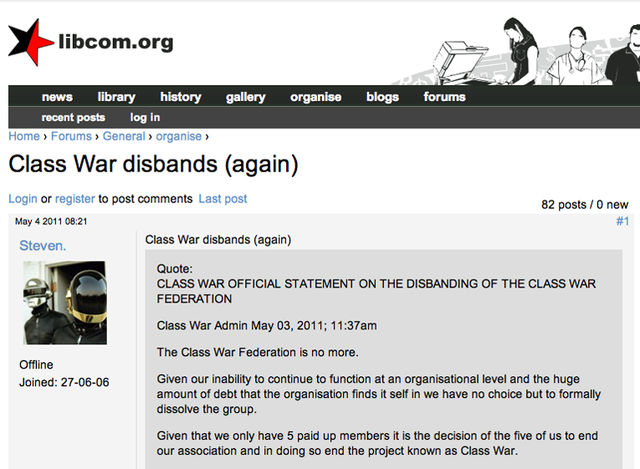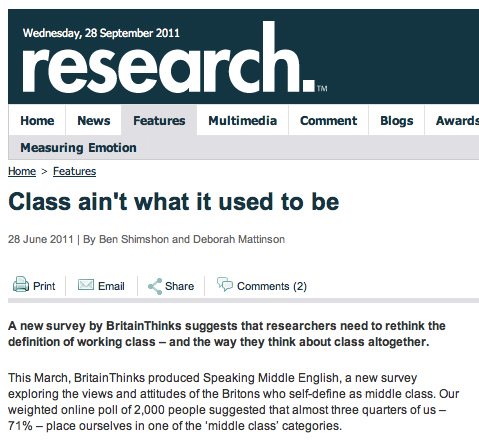Total Failure of Class War Politics in Britain
Tool Kit | 29.09.2011 00:02 | Public sector cuts | Workers' Movements
2. Class War anarchist Ian Bone's petition against Eton private school - 20 signatures
3. Class War anarchist group closes in May 2011 (with just 5 members)
4. Poll which found 71% of Britons now see themselves as Middle Class
The title of this post is meant to be ironic, as the Class War as it's fought both in Britain today and world-wide has been wildly successful. The ruling class seek to destroy the historic achievements of working-class and liberal-reformist political movements, by wrecking public services, creating unemployment (to use unemployment as a selective and strategic political weapon), and using the tax revenues that fund any remaining services to steer billions into the private corporations which they own and which they use to replace the Welfare State's traditional service providers.
Working-class acquiescence to, and (even worse) support for this programme, was achieved by a culturally sophisticated political strategy, which, rather than stealing from the rich to give to the poor, after the model immortalised in traditional British popular culture, instead stole from the State to give to poor, through a daring sleight-of-hand in which the British proletariat were tricked into buying Council Houses which (in theory at least) they already owned. Despite the damage inflicted on the working-class by public service cuts and unemployment, the Monetarist programme was so successful that it was able keep the Tory government that implemented it in power for 18 years, and able to ensure that their New Labour and Coalition successors continue the same basic programme. As the Situationists showed, part of the success of the long-term ruling-class project has been to convince workers that the ruling-class has become (to a degree) democratic, by exaggerating the extent to which, rather than being aristocratic, the ruling-class now appears to be at least partly meritocratic.
In contrast, Anarchist ideas are respected by a significant minority of British people, as a profoundly idealistic expression of the best aspects of human nature, but mocked in equal measure for their failure to realistically address problems of anti-social crime or to address practical issues of social infrastructure. Most Anarchist ideology was forged in the heat of Victorian-era industrialisations, when the State oppressed and taxed without providing public services, but today Anarchist thinking is out of touch with pragmatic realities of the Welfare State, democratic liberalism and consumer society. Faced as we are with crises in part created by the rapid erosion of that Welfare State, Anarchist dogma hasn't even caught-up enough to resolve the contradiction between opposing the State and supporting Welfare, leaving potential supporters confused, alienated and even worse just plain bored by such self-evidently contradictory aspects of Anarchist thinking.
As a case in point, the first issue of Ian Bone's Class War newspaper suggested that "most Anarchists are just liberals (and) those of us who believe in class war shouldn't hesitate to give them the boot", and, as shown above, the long-term political results of that strategy speak for themselves. The American writer T.E. Carhart reports a French aphorism that "life is a river, and we all have to find a boat that floats". Class War anarchism is a boat that's sunk. The purpose of this post is not however to promote division, disillusionment or apathy - the purpose of this post is to encourage radicals to throw their weight behind political strategies that stand the best chance of actually working.
____________________________________________
State strategies to wreck UK Uncut, Dale Farm & March 26 etc...
 https://www.indymedia.org.uk/en/2011/09/485095.html
https://www.indymedia.org.uk/en/2011/09/485095.html The Anti-Cuts movement will succeed if it defends true democracy...
 https://www.indymedia.org.uk/en/2011/09/485130.html
https://www.indymedia.org.uk/en/2011/09/485130.html Occupy! Manchester - 2nd October Tory Party Conference...
 https://www.indymedia.org.uk/en/2011/09/484933.html?c=on#comments
https://www.indymedia.org.uk/en/2011/09/484933.html?c=on#comments
Tool Kit




Comments
Display the following 37 comments